(More than) Ten Questions with Jeffrey Lewis (at Reverb on Tuesday w/David Nance)…
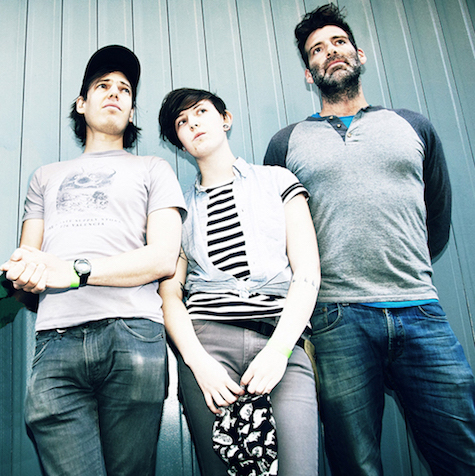
Jeffrey Lewis & Los Bolts play Reverb Lounge Tuesday, Nov. 15.
by Tim McMahan, Lazy-i.com
(Note: Pt. 1 of this interview actually appeared last Wednesday as a comment to the disasterous 2016 Presidential election. Take a look).
I first discovered Manhattan folk/punk singer/songwriter Jeffrey Lewis’ music back in 2013 when Lewis opened for Quasi at Slowdown Jr. I knew virtually nothing about him then, and a half-hour later, upon completing his set, I became a fan.
At the time, Lewis was out supporting the vinyl re-release of his Rough Trade debut LP, The Last Time I Did Acid I Went Insane, a set that captures his earliest urban folk storytelling in all its glory. A few years after that came out, Lewis caught a broader audience’s attention with 12 Crass Songs (2007, Rough Trade), wherein our hero covered 12 songs by ’70s English punk band Crass.
Lewis’ latest, Manhattan (2015, Rough Trade), collects 11 clever, tuneful story songs, this time backed by his band Los Bolts. His style has been described as anti-folk, maybe because any of these songs could be reimagined by a hyper-kinetic straight-four hardcore band. In fact, Lewis’ style has more in common with the latter-day Lou Reed (album opener “Scowling Crackhead Ian” would sound right at home alongside anything on Reed’s New York album), while “Avenue A, Shanghai, Hollywood,” sung by Mim Pahl, and indie band life lesson “Support Tours” would make Mountain Goats’ John Darnielle smile. Other songwriters that come to mind include Wall of Voodoo’s Stan Ridgway and fellow story-teller Mark Kozelek, though Lewis’ music is never as dour.
For me, Lewis and his music epitomize the same raw, matter-of-fact narrative style and humor of some of my favorite underground comic book writers/artists, like R. Crumb, Daniel Clowes and Harvey Pekar. Not surprising, Lewis augments his music career with his own comic book series, Fuff, a copy of which you’ll likely have a chance to examine (and buy) when Lewis and Los Bolts play Reverb Lounge Tuesday, Nov. 15.
Usually I give touring musicians the Ten Questions treatment, but I couldn’t pass up an offer to do a phoner a couple weeks ago with Lewis from his Manhattan home.
Are you still touring your latest album, Manhattan, which came out a year ago?
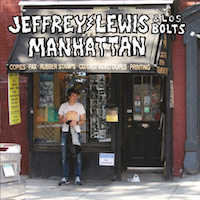
Jeffrey Lewis, Manhattan (2015, Rough Trade)
Jeffrey Lewis: Part of the reason for that is because I do everything myself. I’m the one who has to book all the gigs. Right now I’m sort of deeply embroiled in mailing out all of the posters for the different shows. I just mailed a bunch of posters out to Olympia, Washington, today and I’ve got to mail out posters to Denver tomorrow. The constant checklist of things that need to be done kind of means that I can’t really do these tours back to back because it’s just too much work to do all at once by myself. I kind of need things to be spaced out just because there’s only so many hours in a day.
Do you get any help at all from the label? I ask because I don’t know what a label provides anymore. I guess they put out your record. In the old days, a label could help with tour support, they could help you book the tour, they could help you with promotion. It seems like labels don’t have the resources for anymore.
It certainly seems to be the case. I don’t know. I feel like in some ways I entered the music business at the right time, although some people might think it was the exact wrong time. My first album on Rough Trade came out in 2001. My entire experience touring and dealing with record labels has been in the internet age. I’ve been on Rough Trade 15 years and I’ve been touring and doing all this stuff and making my living at this for that whole time period, I never existed in the music industry during a time when there was a thought that it could be a different way.
I never existed in the music industry during the time when independent bands and alternative music was riding a certain financial wave through the late ’80s and through the ’90s; there was so much more money in it in terms of album sales, in terms of what you would expect even a small-level independent album to sell and the amount of support that was available, tour support and promotion and everything else.
I feel like a lot of artists went through a real crashing of expectations or a real readjustment of what they were expecting to do or what they were expecting to make. I never had that. For me from the get-go it was like, if I was going to do anything I basically learned pretty quickly that I was going to have to do it for myself and figure out ways to make it work.
Of course I do credit Rough Trade tremendously with really helping me out by being interested in me in the first place and continuing to be interested in me all these years later. I can’t imagine there’s very many artists on the label that could possibly make less money for the label than me. They put out the Strokes, they put out Belle and Sebastian, they put out some pretty major players in the Indie music realm.
It’s almost crazy to me that they’re still interested in putting out a Jeffrey Lewis album every couple of years. To me that’s just really cool. I’m happy about that element of the relationship. I’m happy to be associated with them and I’m glad that they’re so far still happy to be associated with me.
Tell me about your backing band, Los Bolts. Who’s in it?
It’s definitely been a challenge to keep one band together for a long period of time. Since I have been doing this about 15 years, I’ve probably had maybe six different drummers and maybe four different bass players or something like that.
Jeffrey Lewis and Los Bolts on this tour is the same band that I’ve been with for about a year now, which is Brent Cole on drums. He was in the Moldy Peaches and Dufus, which are two New York bands that I did a lot of touring with over the years. I’ve known Brent for a long time and I’ve toured with him before though not as a member of my own band.
On bass is Mem Pahl, and she’s very young. She just turned 22. It’s kind of an interesting contrast where Brent and I are both 40 and we’ve been doing this essentially since the late ‘90s, although only doing it professionally since 2001 or so. Mem is really just like of a younger generation and brings the music that she wants to play in the car, and the perspective that she has on the music scene is really interesting and it’s made a really cool dynamic.
We’ve done a lot of touring together in this particular trio format of the past year. Mem was actually playing bass with me for almost a year prior to that, too. I’m sort of almost going into two years with Mem on bass. She was only 20 when she started with me.
It’s kind of interesting to have these different dynamics over the years and how the different combinations of people that I’m with kind of create different chemistries. It’s like any relationship, when you start dating somebody and over time it just gets deeper and the layers of experience kind of make it richer. It’s sad if some musician ends up not being able to continue touring because maybe somebody got married or had a kid or they move away from New York City. There’s a million reasons why somebody wouldn’t be able to stay in my band forever. Every time that chemistry breaks up and I have to sort of start trying to develop a new relationship it’s a bit sad to have to start from scratch.
My favorite song on the record is “Have a Baby.” I assume it’s about people who lose interest in things that they love after they have a family. Is that kind of what you were going for and were you experiencing that with your friends when you wrote that song?
Yeah. I like that a song a lot. It was really a fun song to put together because I feel like it’s structurally different than other stuff that I’ve done. The sentiment of it in some ways cancels itself out because it can be seen from two different perspectives I guess depending on which side of the argument somebody is looking at it from. I didn’t really realize that when I wrote it, I guess.
I feel like if you were the person who was having a baby you could look at that song as a sort of unpleasant sarcastic comment on how maybe now that you’re having a baby you’re not going to be able to do anything interesting anymore. The other side of it, which was sort of more of the side that I started writing the song with in mind, I was just thinking of all of the frivolous things that life is filled with, all of the details that we pay attention to, that occupy our time. Some event can come along that makes them seem very petty — things that you sort of put aside when something more important arrives. Proliferation of details that seem important when you’re engaged in it, but some life-changing event can happen that can make them actually look sort of insane, in their detailed specificity, or the necessity that they seem to have when you’re absorbed in them.
I did realize while making the song that it kind of, it had to be two different perspectives that it could be seen by, each of which is kind of unpleasant, it could kind of sort of be insulting for both sides of the equation, I guess.
Well when I first heard it I thought of your original intention until I read a review of the record where the reviewer said the opposite. I hadn’t thought about it and I said, ‘Oh, that must be what he was going for.’ Obviously that wasn’t what you were going for.
Yeah, and of course it’s always a mistake for the artist to say, ‘Well it’s supposed to be taken like this.’ A lot of times people hear something and if they like it then it’s really not a good thing for me to explain ‘Oh no, you’re wrong, you like it but you’re not thinking of it the right way.’ Whatever way people want to think of it is their own business and I think me putting my two cents in to say that you’re supposed to think of it one way or the other is really only to the detriment of the art. It should just be out there for people to make of it what they will.
Speaking of art, I love your artwork. First of all why don’t you sell your artwork online anywhere and how important is making your comics in your life?
The comics are an important component of my financial existence, but are very tied in with the music. Most of the freelance art jobs that I get are through people knowing me through music. The Mountain Goats comic book press kit thing that I drew a few years back or the artwork that I’ve done for the band the Cribs or other projects like that where somebody knew me through music or a band that I toured with or played gigs with.
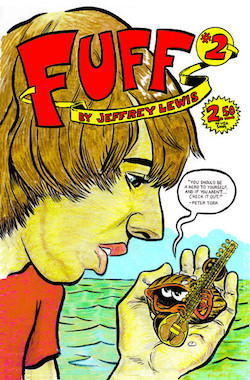
Fuff No. 2 by Jeffrey Lewis.
These ended up being really good freelance art jobs for me, but I wouldn’t have gotten them if it wasn’t for the fact that they knew me first through music and then when they needed an artist or they needed a comic book artist or an illustrator. I just happened to be there or I was somebody that they had already met. It’s not like I’m going around to magazines and dropping off a portfolio.
In addition to that, a lot of people who buy my comic books are buying them through my website, which is kind of like my music. People might come to my website because they’ve heard an album and then they’re like ‘Oh, these comic books are here also, maybe I’ll buy some of those.’ Then I have the comic books at the merchandise table at my concerts. They’re are illustrated songs that I perform at the gigs, too. The comics and the music are sort of very much tied together in a way that isn’t really two different careers; they sort of rely on each other and I can’t really totally separate them out as two different careers even though they’re sort of two very different disciplines.
As far as selling original art, I don’t know. I don’t know how much to price it. I’ve never thought of my art as something to sell. I just draw stuff so that I can turn it into comic books really. I’ve just never really entered that realm of like somebody who sells original art. It’s just kind of alien to me.
That’s another sort of hassle in trying to do all the stuff myself. Right now I’m trying to calculate how many comics do I need for this tour, how many boxes should I mail to the west coast? How many can I fit in my car actually, how many CDs, how many records? How much room is the drum case going to take up so how many t-shirts can we take with us? You don’t want to run out of merchandise when you’re out on the road because it’s a major part of financing a tour. But it is hard to know how much to take.
I think you need to hire an intern.
I did actually, I did hire an intern a couple of years ago. I had a couple of people that would come over like once a week and I was paying them an hourly wage to help me do the website stuff. The people that order stuff from my website, we sort of had one day where we’d all work together packing up orders and bring them to the Post Office and dealing with that. I don’t know, somehow everybody just always ended up being too busy.
I was sort of up to paying people 15 bucks an hour which seems like a pretty good rate to just sit around with me and listen to records and pack comic books into envelopes. Even at that rate, it was like I had all these different people that just kept not being available and I kept ending up doing it myself. Now as of the past six months I’ve pretty much just been back to doing it all myself.
I do think I do need more help in general. But everybody does. If you were Donald Trump somebody would do your laundry for you and scrub your floor. For the rest of us there’s work to be done and someone’s got to do it and that’s us.
You could literally draw things when you’re not driving (on tour) and sell them at shows.
Well I mean it’s also I guess for me it’s a problem because I’m not, what’s his name David Shrigley, and I’m not Daniel Johnston in the sense that the art that I make is very time consuming. I feel like for something to actually be a Jeffrey Lewis drawing it might take me like a day to do. I could of course do some kind of quick doodle but then I would kind of feel bad charging money for that and somebody, you know, I don’t know, that’s part of the problem with me selling the original art is I’m like it’s just too valuable to me. I put too much time into it to think of like, well I can’t just sell this for 20 bucks.
It took me two days to do. That means I’ve got to charge 500 bucks for it. But then it’s like well who the hell’s going to pay 500 bucks for it. So it just stays here in my closet.
Those sketches you did for your box sets are just fantastic.
That was a very fun insane project that was a huge amount of work. Those basically are like ‘how fast can I crank out 500 drawings without thinking about it at all?’ I don’t know if I would do that again, but it seemed like a good idea at the time.
Are you working on new material now? Are we going to hear any new stuff when you play in Omaha?
Yeah, I’m always trying to work out some new stuff. I actually just played a show in New York City last night that was 100% all new songs. I was just reading all the lyrics off of lyric sheets for the entire night. I feel like I usually have to write a lot of songs before I end up with any that I feel strong enough to really hold on to. Part of that process is trying out some new material after just letting it have a chance to take shape over the course of different performances and just sort of feeling what it feels like to play stuff in front of people. That’s part of the writing process for me.
I’ll definitely be trying some new stuff. I’m one of those people that feels like just because I wrote a song doesn’t mean that it’s really worth people hearing. Right now I have a pile of maybe about 25 new songs, but of those there’s maybe four or five that I actually consider contenders I might start doing something with.
I do want to ask you one last question, which I ask everybody: What stories have you heard about Omaha, Nebraska?
What stories have I heard about it? In some ways in song writing circles it’s kind of legendary for being the home of Simon Joyner. Simon Joyner was an important influence on me in the ‘90s when I was just starting to get into Indie music and songs and songwriting. Of course Bright Eyes is a pretty major figure in alternative music and Indie songwriting. For an Indie songwriter or an Indie rock band that concentrates on songwriting, I think Omaha has a sort of legend or a sort of a atmosphere to it.
It’s also an interesting part of the country for me to play. I don’t get to play there that often. I mean considering how many times I’ve played Chicago or San Francisco or something, I’ve probably played Omaha only like maybe three times. It’s kind of cool to have a chance to get back there.
Jeffrey Lewis and Los Bolts play with David Nance Tuesday, Nov. 15, at Reverb Lounge, 6121 Military Ave. Tickets are $8, showtime is 9 p.m. For more information, go to onepercentproductions.com.
* * *
Read Tim McMahan’s blog daily at Lazy-i.com — an online music magazine that includes feature interviews, reviews and news. The focus is on the national indie music scene with a special emphasis on the best original bands in the Omaha area. Copyright © 2016 Tim McMahan. All rights reserved.

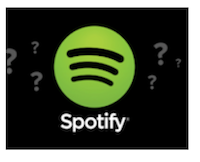 Yesterday Spotify launched
Yesterday Spotify launched 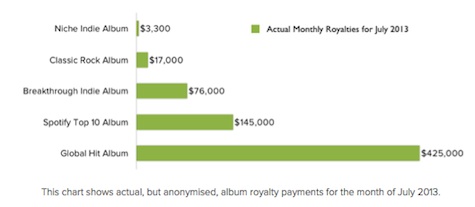 But my favorite part is Specific Payment Figures, where they break down actual pay outs to unnamed artists. In July, something called “Niche Indie Album” was paid $3,300, while “Breakthrough Indie Album” was paid $76,000.
But my favorite part is Specific Payment Figures, where they break down actual pay outs to unnamed artists. In July, something called “Niche Indie Album” was paid $3,300, while “Breakthrough Indie Album” was paid $76,000.
Recent Comments